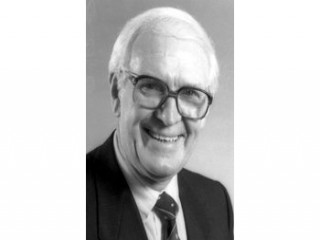
James W. Black biography
Date of birth : 1924-06-14
Date of death : 2010-03-22
Birthplace : Uddingston, Scotland
Nationality : Scottish
Category : Science and Technology
Last modified : 2011-08-15
Credited as : Doctor scientist, Lasker award, Wolf Prize in Medicine
0 votes so far
Sir James Whyte Black's research led to the development of propranolol, a lifesaving breakthrough in the treatment of heart disease. Propranolol is a beta-blocker, interrupting adrenaline's stimulating effect on the heart and reducing the heart's need for oxygen. The medicine is used in treatment of angina, high blood pressure, migraine headaches, tremors, anxiety, and panic disorders. He also developed cimetidine, which inhibits acid secretion in the stomach and is thus used to treat heartburn and ulcers.
Black's career was split between academic labs and pharmaceutical giants, and he was awarded the Nobel Prize for Medicine in 1988, sharing the honor with two American researchers from North Carolina, Gertrude B. Elion and George H. Hitchings. When told he had won the Nobel Prize, Black quipped, "I wish I had my beta-blockers handy." His wife died four years before Black received his honors, and in his biography for the Nobel Committee he described her as the most intellectually exciting person he ever knew.
Black was made a Knight Bachelor on 10 February 1981 for services to medical research, receiving the honour from the Queen at Buckingham Palace. On 26 May 2000 he was appointed to the Order of Merit, of which there are only 24 members at any one time, by Queen Elizabeth II.
He was elected a Fellow of the Royal Society in 1976 and the same year he was awarded the Lasker award. In 1979, he was awarded the Artois-Baillet Latour Health Prize. In 1982 Black was awarded the Wolf Prize in Medicine. He was awarded the 1988 Nobel Prize in Medicine along with Gertrude B. Elion and George H. Hitchings for their work on drug development. In 1994 he received the Ellison-Cliffe Medal from the Royal Society of Medicine.
















